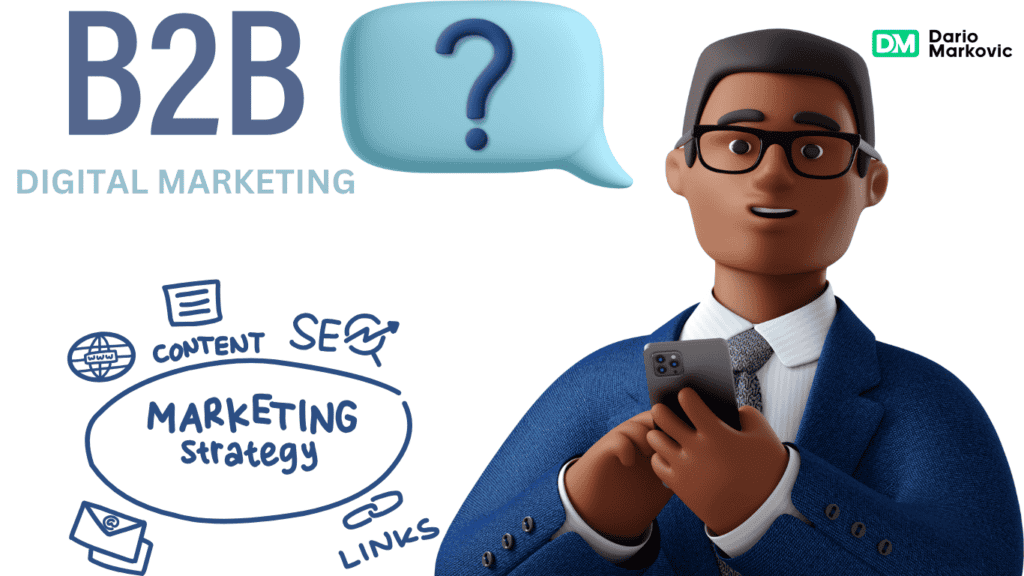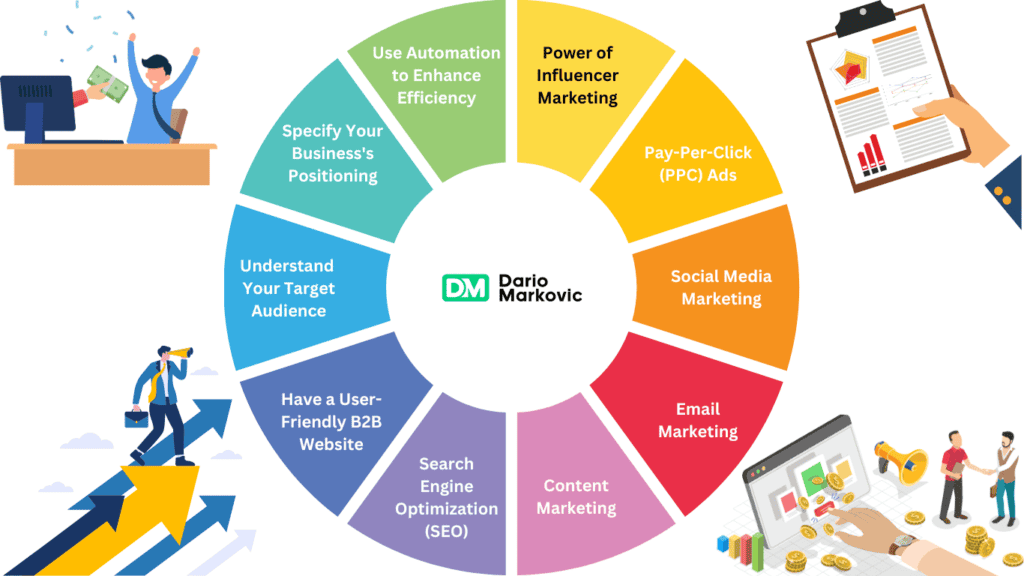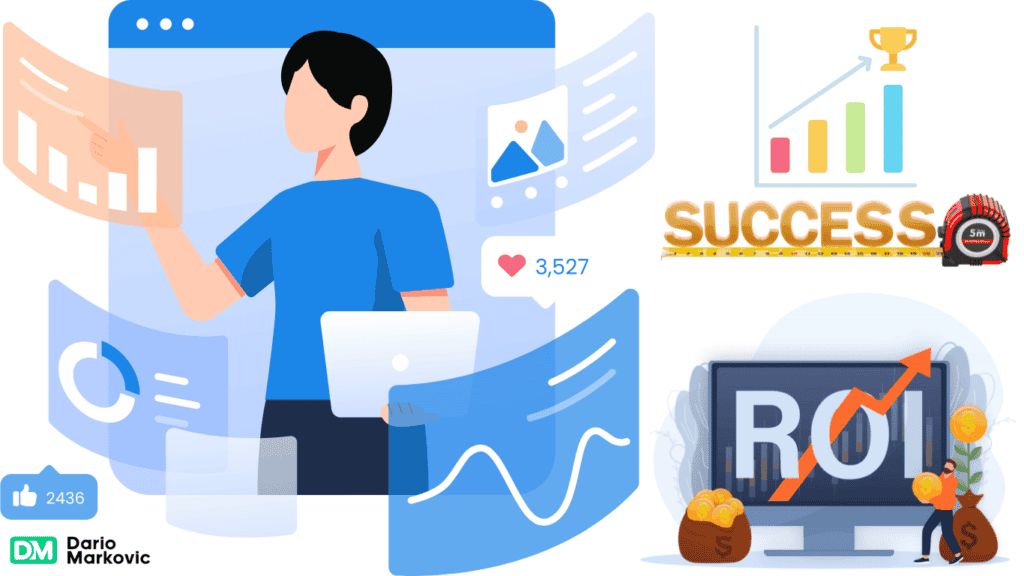I’m about to share something that’ll blow your mind: B2B digital marketing is the key to unlocking your business’s full potential. I know; you’ve probably heard that a million times before.
But trust me, I’ve been in the trenches and seen firsthand how the right strategies turn a struggling business into a digital transformation journey.
So buckle up and get ready to take some notes, whether you’re a seasoned marketer or starting. I’m about to share some profound knowledge on how to crush it in B2B digital marketing.
What Is B2B Digital Marketing?

So, what exactly is B2B digital marketing? It’s marketing products and services to other businesses and organizations through online channels and digital technologies.
How B2B Marketing Differs from B2C Marketing
B2B digital marketing focuses on building relationships with other businesses and decision-makers, while B2C marketing targets individual consumers.
A B2B marketing agency often involves longer sales cycles, more complex products or services, and a focus on ROI and business value.
I’ve seen firsthand how B2B vs B2C marketing requires a different approach. You’re dealing with multiple stakeholders, longer decision-making processes, and a need to demonstrate clear value and expertise.
Benefits of B2B Digital Marketing
B2B digital marketing offers numerous benefits, such as increased brand awareness, improved lead generation, and enhanced customer engagement.
By leveraging digital channels, B2B companies can reach a wider audience, nurture leads more effectively, and build stronger customer relationships.
In my experience, a well-executed digital marketing strategy can be a game-changer for B2B businesses. It lets you target the right decision-makers, showcase your expertise, and drive more revenue.
10 Digital Marketing Strategies for B2B Companies

Companies should employ various marketing strategies to succeed in B2B digital marketing, including content marketing, email marketing, social media marketing, search engine optimization (SEO), and pay-per-click (PPC) advertising.
By combining these tactics, B2B businesses can effectively reach and engage their target audience, generate leads, and drive conversions.
I’ve implemented these strategies for numerous B2B clients, and I can tell you that the key is to create a cohesive, multi-channel approach that aligns with your business goals and target audience.
1. Specify Your Business’s Positioning
Defining your business’s unique positioning is crucial for effective B2B digital marketing. By identifying your target market, understanding their pain points, and highlighting your unique value proposition, you can create a compelling brand message that resonates with your audience and sets you apart from competitors.
I always start by working with clients to clarify their positioning and develop a strong foundation for their marketing campaigns. This helps ensure that all online marketing efforts align and focus on achieving business goals.
2. Understand Your Target Audience
Understanding your target audience deeply is essential for creating effective B2B digital marketing campaigns.
By conducting market research, analyzing customer data, and creating buyer personas, you can gain valuable insights into your customers’ needs, preferences, and behaviors, allowing you to tailor your marketing tactics accordingly.
I’ve found that the more you know about your potential customers, the better you can craft messages and offers that resonate with them. This is especially important in B2B, where you often deal with multiple purchase decision makers and complex buying processes.
3. Have a User-Friendly B2B Website
A user-friendly website is the foundation of successful B2B digital marketing. Your website should be easy to navigate, visually appealing, and optimized for mobile devices.
You can engage visitors and guide them through the buyer’s journey by providing valuable content, clear calls to action, and a seamless user experience.
I can’t stress enough how important investing in a high-quality website is. It’s often the first interaction potential customers have with your brand, so it needs to make a great impression and effectively communicate your value proposition.
4. Help Customers Find You With Search Engine Optimization (SEO)
SEO is critical to B2B digital marketing, as it helps potential customers find your business online. By optimizing your website for relevant keywords, creating high-quality content, and building authoritative backlinks, you can improve your search engine rankings and drive more organic traffic to your site.
One key aspect of SEO is creating content that incorporates your target keywords and provides value to your audience. This can include informative blog posts, case studies, whitepapers, and more.
By consistently publishing high-quality content that addresses your customers’ pain points and interests, you can establish your brand as a thought leader in your industry and attract more qualified leads to your website.
Another crucial element of SEO is building high-quality backlinks from reputable websites in your industry. This signals to search engines that your website is a trusted and authoritative source of information, which can help improve your rankings for specific keywords.
Some effective strategies for earning backlinks include guest blogging, broken link building, and creating valuable resources to which other websites will want to link.
5. Offer Valuable Information and Insights With Content Marketing
Content marketing is a powerful strategy for B2B businesses. It allows you to demonstrate your expertise, provide value to your audience, and build trust with potential customers.
By creating informative blog posts, whitepapers, case studies, and other types of content, you can attract and engage your target audience, nurture leads, and establish your brand as a thought leader in your industry.
One key to successful content marketing is understanding your target audience and creating content that speaks directly to their needs and interests.
This requires conducting thorough market research, analyzing customer data, and gathering feedback from your sales and customer service teams.
By deeply understanding your customers’ pain points, challenges, and goals, you can create content that resonates with them and demonstrates your expertise in solving their problems.
Another important aspect of content marketing is promoting your content through various channels, such as social media, email newsletters, and industry publications.
By actively sharing your content and engaging with your audience on these platforms, you can expand your reach, drive more traffic to your website, and generate more leads for your business.
6. Nurture Your Leads and Strengthen Customer Relationships With Email Marketing
Email marketing is an effective way to nurture leads and strengthen relationships with existing customers in the B2B space.
By sending targeted, personalized emails that provide valuable information and resources, you can keep your brand top-of-mind, build trust, and guide prospects through the sales funnel.
When crafting your email newsletters, it’s essential to segment your audience based on their interests, behaviors, and stages in the buyer’s journey.
This allows you to deliver more targeted and relevant content that speaks directly to their needs and challenges.
For example, you might send different newsletters to prospects who have downloaded a whitepaper versus those who have attended a webinar or requested a product demo.
Another key aspect of effective email marketing is personalization. Using your subscribers’ names, company information, and other relevant data points in your emails can create a more engaging and personalized experience that makes them feel valued and understood.
This can help build stronger relationships with your customers and increase their loyalty to your brand.
7. Connect With Your Customers Through Social Media Marketing
Social media marketing allows B2B companies to connect with their target audience, share valuable content, and engage in meaningful conversations.
Maintaining an active social media presence on relevant platforms, such as LinkedIn, Twitter, and Facebook, increases brand awareness, drives traffic to your website, and builds relationships with potential and existing customers.
An essential part of social media marketing is creating content that resonates with your target audience and encourages engagement.
This can include asking questions, running polls, and sharing industry news and insights that spark conversations and debates.
By actively engaging with your followers and responding to their comments and messages, you can build stronger relationships and foster community around your brand.
Another critical aspect of social media marketing is using paid advertising to expand your reach and target specific audiences.
Platforms like LinkedIn and Facebook offer robust advertising options that allow you to target users based on their job titles, industry, interests, and other key demographics.
Creating compelling ad copy and visuals that speak directly to your target audience’s needs and pain points can drive more qualified traffic to your website and generate more leads for your business.
8. Run Pay-Per-Click (PPC) Ads if Your Budget Allows
PPC advertising can be a highly effective way to drive targeted traffic to your B2B website and generate leads. By creating compelling ad copy, targeting the right keywords, and optimizing your landing pages, you can maximize your return on investment and achieve your marketing goals.
When I started running PPC campaigns for my B2B company, I focused on targeting keywords relevant to our products and marketing services.
By conducting thorough keyword research and analyzing our competitors’ ad strategies, we identified the most valuable keywords for our business and created ads that spoke directly to our target audience’s needs and pain points.
One key to successful PPC advertising is creating compelling ad copy that grabs your audience’s attention and encourages them to click through to your website.
This requires understanding your customers’ motivations, challenges, and goals and crafting messages that speak directly to their needs.
It’s also essential to use strong calls to action that communicate the value of your products or services and encourage users to take the next step in the buyer’s journey.
Another crucial aspect of PPC advertising is optimizing your landing pages for conversions. Users who click on your ad should be directed to a page to convert them into leads or customers.
This requires creating a clear and compelling value proposition, highlighting your unique selling points, and providing a seamless user experience that guides them toward taking the desired action, such as filling out a form or purchasing.
9. Leverage the Power of Influencer Marketing
Influencer marketing can be a game-changer for B2B companies looking to expand their reach and generate high-quality leads.
By partnering with industry thought leaders and experts, you can tap into their credibility and audience to boost sales and your brand’s visibility and authority.
I’ve seen firsthand how collaborating with the right influencers can skyrocket engagement and drive targeted traffic to your website.
It’s all about finding those individuals who align with your brand values and genuinely connect with your target audience.
When done right, influencer marketing can:
- Increase brand awareness
- Enhance trust and credibility
- Generate high-quality leads
- Improve SEO through earned media and backlinks
The key is approaching influencer partnerships as mutually beneficial, not just one-off transactions. Focus on building genuine connections, co-creating valuable content, and delivering value to your audience.
10. Use Automation to Enhance Efficiency
Marketing tools and automation can be lifesavers for busy B2B marketers who want to streamline their efforts and maximize results.
Automating repetitive tasks like email campaigns, social media posting, and lead nurturing saves time and resources while delivering a more personalized experience to your audience.
I’m a big fan of using automation to:
- Segment and target specific audience groups
- Trigger personalized email sequences based on user behavior
- Schedule and publish social media content
- Score and prioritize leads
- Analyze and optimize campaign performance
Automation frees up your time and mental energy to focus on the strategic, creative aspects of B2B digital marketing that move the needle.
Just be sure to regularly review and adjust your automated processes to ensure they align with your goals and deliver the best possible user experience.
Measuring Success in B2B Digital Marketing

Setting Goals and KPIs
To measure the success of your b2b digital marketing plan, you need to start with clear, measurable goals and key performance indicators (KPIs). These will serve as your north star, guiding your strategies and helping you track progress.
Some common KPIs for B2B marketers include:
- Website traffic and engagement metrics
- Lead generation and conversion rates
- Sales pipeline velocity and close rates
- Customer acquisition costs and lifetime value
- Brand awareness and sentiment
The specific KPIs you choose will depend on your unique business goals and marketing objectives. The key is to focus on the metrics that matter most to your bottom line and align your team around those shared targets.
Tracking and Analyzing Data
Once you have your goals and KPIs, it’s time to start tracking and analyzing your performance data. Tools like Google Analytics, marketing automation platforms, and CRM systems are helpful here.
By regularly monitoring your key metrics, you can gain valuable insights into what’s working, what’s not, and where there’s room for improvement. Look for patterns, digital marketing trends, and anomalies that can help inform your optimization efforts.
Remember, data is only as valuable as the insights you glean from it and your actions. Ensure you’re setting aside time to review and discuss your analytics with your team and continuously use those insights to refine your B2B digital marketing strategies.
Adjusting Strategies Based on Results
The most successful B2B marketers constantly learn, iterate, and adapt based on their results. They understand that measuring success is an ongoing process, not a one-time event.
As you track your performance and uncover insights, be prepared to pivot your digital marketing strategies accordingly.
This might mean doubling down on channels and campaigns, delivering solid results while dialing back or eliminating those not moving the needle.
The key is to stay agile, open-minded, and data-driven in your approach. Don’t be afraid to experiment with new ideas, test different variations, and fail fast when something isn’t working.
The more you can embrace a culture of continuous optimization, the better equipped you’ll be to drive long-term success with your b2b digital marketing efforts.
Dario’s Takeaway
B2B digital marketing is a game-changer, plain and simple. By implementing these 10 strategies for marketing tips, you’ll be well on your way to dominating your niche industries and leaving your competitors in the dust.
So go out there and make it happen with my tools and embrace the power of digital marketing! Watch your business soar to new heights. The future is yours!



